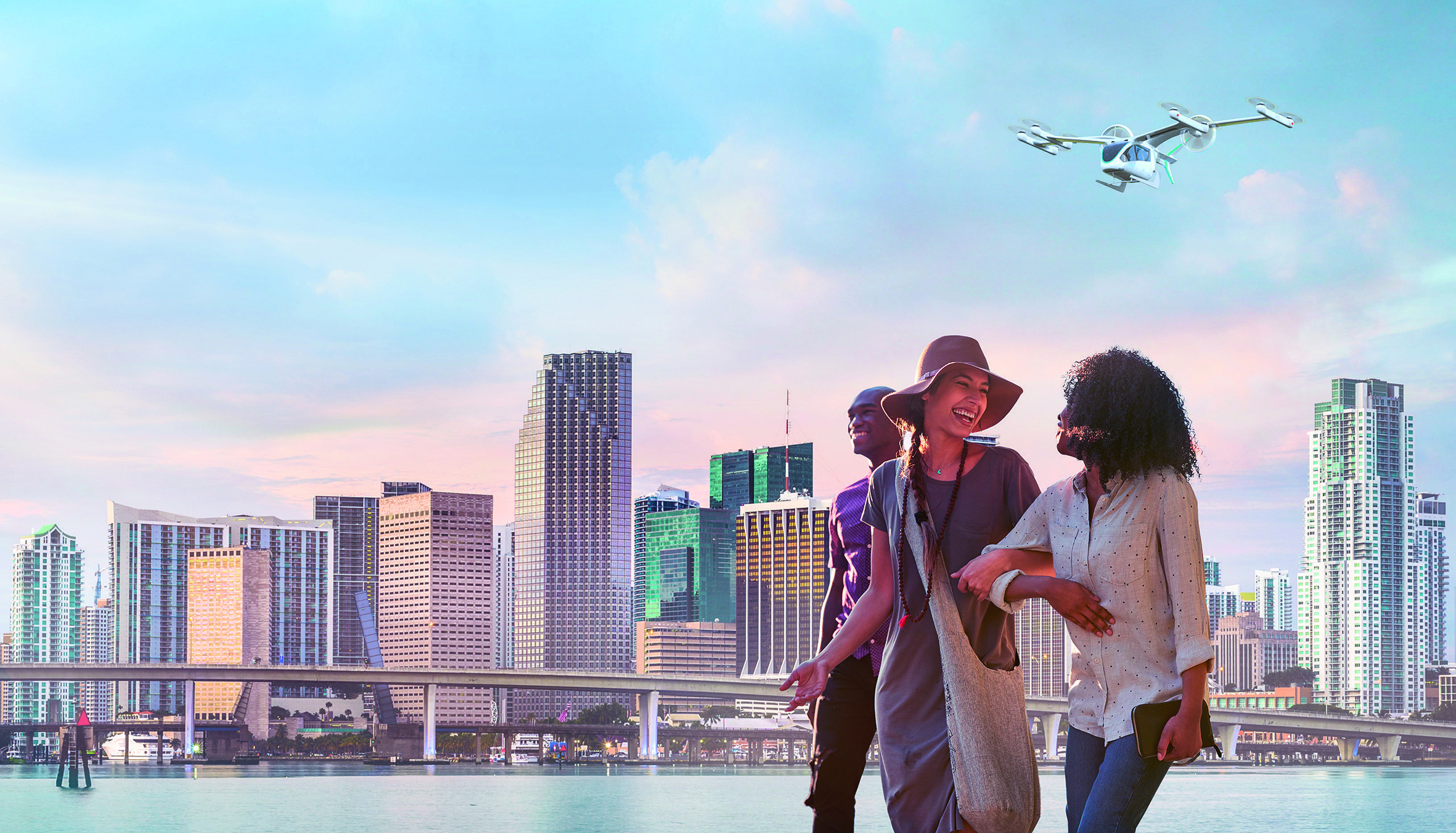If you’re counting, this makes at least 5 eVTOL companies now circling the Miami market.
The path to urban air mobility – all-electric air taxis – will be much smoother if the community is on board and involved in co-creating the emerging industry. That’s the view of Eve UAM, a unit of the global aerospace company Embraer and the latest player in the emerging industry to put Miami in its launch plan for an efficient and green mode of transit.
Eve builds eVTOLs (electric vertical take-off and landing aircraft vehicles) and equips them with the innovative technologies to make them air taxis. Eve spun out of an Embraer accelerator and if all goes according to plan will be a public company sometime in the second quarter through a SPAC transaction with Zanite Acquisition Corp., but will maintain strong ties with the Brazil-based Embraer, which has been operating in South Florida for over 40 years. Eve plans to pair up with local partners that will operate the ride-sharing service. In Miami one of its partners is Miami-based Global Crossing Air Service, known as GlobalX, a charter airline serving US, Caribbean, and Latin American markets.
Eve announced today that GlobalX has signed a Letter of Intent to order up to 200 of Eve’s eVTOLs. This potential sale is included in Eve’s current order backlog of up to 1,785 eVTOLs, the largest in the industry. The company expects to start the deliveries in 2026. “These eVTOLs will enable us to expand our market throughout South Florida, bringing our customers to their flights at MIA and FLL, as well as local flying within Key West and all of the Keys, Naples, and Palm Beach,” said Ed Wegel, Chair and CEO of GlobalX, said in a statement.
Eve also announced today that it formed a consortium of leading urban air mobility organizations and technology companies, including Skyports, which builds and operates vertiports, L3Harris Technologies, a specialist in air traffic management tech, and the Community Air Mobility Initiative advocacy organization to develop a “Concept of Operations” for air taxis between Miami International Airport and the Miami Beach Convention Center. Miami is the first market in the US in which Eve has done a Concept of Operations in, although it has done them in other parts of the world, including, Melbourne, Australia, Rio de Janeiro and the United Kingdom.
“This is an agnostic contribution to the development of urban air mobility concepts and proposed procedures and is a foundation upon which local industry can build in order to get ready for urban air mobility in Miami-Dade,” said David Rottblatt, VP of Business Development for Eve, in an interview with Refresh Miami. “It’s a start.”

The consortium examined what would be required for the service, received feedback from stakeholders across Miami-Dade, and accessed locally, publicly available information to understand UAM (urban air mobility) could safely support an airport shuttle use case in the county. The consortium will now hold “listen and learn” sessions with community stakeholders, peers, and potential operators to examine how additional procedures and frameworks can be developed in the coming months and years to facilitate the successful adoption of UAM operations in Miami-Dade.
Later this summer, the team will present its findings to the county and public stakeholders. Separately, the Miami Dade’s Board of County Commissioners also established and Urban Air Mobility Working Group, which has already begun meeting.
All of these developments should “make it very real for South Florida to see that this is not some kind of amorphous concept that is light and doesn’t really have substance,” said Rottblatt. “There’s real customers, there’s real orders, there’s real companies that are involved in creating this future.”
Eve sees a number of use cases beyond an airport shuttle service, said Rottblatt. Commuters could take the service to from the suburbs to downtown Miami or Fort Lauderdale. It could be popular with tourists wanting to hit the beach or an attraction. “We’re selling the result, we’re selling almost a lifestyle, which is time savings to get to your family sooner, to return that time back to yourself so you can do other things besides sitting behind the wheel in traffic,” said Rottblatt.
Miami will likely be one of the initial markets for Eve’s eVTOLS, and its partners that will operating the services could be launching them as early as 2026. “Miami-Dade County and Florida present a great opportunity for Eve to create a blueprint that can be replicated in markets in North America and other regions as we look toward the introduction of UAM operations,,” said Andre Stein, co-CEO of Eve.
Why Miami-Dade? Beyond the fact that Eve has a big partner here in GlobalX, Rottblatt said South Florida checks all the boxes, including the major pain points of traffic and insufficient public transit.
Eve estimates that, initially, a typical 20-mile trip would fall between what an UberX and UberBlack would cost but that this is designed to be increasingly more and more affordable as the industry scales, Rottblatt said. “And beyond being accessible and affordable, it’s sustainable, because it’s 100% electric. There’s no emissions to this, so this should keep Florida skies blue and clean for many years to come.”
What’s more, when the community is ready and the FAA deems autonomous transportation safe, the cost will drop more, Rottblatt said. “Our expectation is that we will evolve from piloted to a remotely piloted or an autonomous aircraft within 10 years and when you do that, the need for a pilot in your aircraft pilot seat can be replaced with up to two more passenger seats. You’re no longer paying for the cost of the pilot on your ticket and now you’re sharing the cost of the flight with two additional people.” Eve’s initial vehicle is designed for four passengers and a pilot.
Embraer Group, headquartered in Brazil, has significant experience in this. The aerospace giant created the complete suite of air traffic control products that’s used to manage all of Brazil’s airspace, including in Sao Paulo, the world’s largest air taxi market, that has almost 1300 air taxi flights in conventional helicopters every day, Rottblatt said.
“We’re taking what we’ve learned and bringing that into eVTOLS. We’re developing the next generation air traffic management software that will allow this industry to grow safely,” Rottblatt said. “While this might be new for South Florida, this is an industry that has been thriving for many, many years. There’s a lot of existing procedures, infrastructure practices that we can benefit from, in order to make sure that Miami has a safe and happy start.”

There are at least four other companies also wanting to make Miami an initial market, with plans to launch service between 2024 and 2028: Supernal, an eVTOL service planned by Hyundai Motor Group; Archer Aviation, one of the first to announce Miami would be one of its two launch cities, along with LA. Joby Aviation, a California startup that acquired Uber Elevate, Uber’s former air taxi arm; and Lilium, a German company that plans rides up to 180 miles in Florida. In Orlando, another company, LuftCar, is developing a hydrogen dual use air and road eVTOL.
READ MORE IN REFRESH:
- Getting crowded up there: At least 4 companies, including Supernal, are now circling the Miami market
- Archer’s air taxi mission gets off the ground – quite literally
- Joby’s deal with REEF could bring air taxis to Miami by 2024
- Up, up and away? Perhaps soon. Meet the air taxi companies that love the Magic City
Sign up for Refresh Miami’s free weekly newsletter here.
- Tech and politics do mix at 2024 Miami Tech Summit, with eye on the future - April 18, 2024
- #MiamiTech Everything: Seen and heard in April - April 17, 2024
- 8+ things to know in #MiamiTech: Dapta and Siprocal raise funding, plus news from Jeff Bezos, MoonPay, Sustainable Skylines, Freebee & more - April 11, 2024





